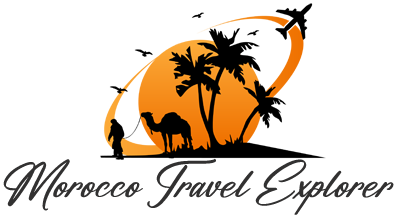History and geography of Morocco
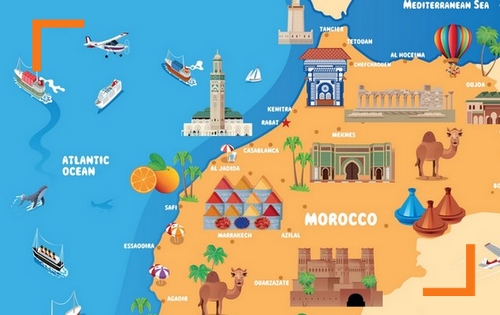 Its location at the intersection of Europe and Africa make Morocco a real crossroads bordered by the waters of the Mediterranean and open to the vast stretches of the Atlantic Ocean. This “farthest land of the setting sun” is rich in contrasts, a destination that beckons you to discover two millennia of history.
Its location at the intersection of Europe and Africa make Morocco a real crossroads bordered by the waters of the Mediterranean and open to the vast stretches of the Atlantic Ocean. This “farthest land of the setting sun” is rich in contrasts, a destination that beckons you to discover two millennia of history.
Here where influences converge, you will find vestiges of the great Mediterranean civilizations, such as the Roman ruins at Volubilis in the north and architectural works attesting to the old French presence in Rabat. Your curiosity will be piqued by the treasures of Muslim civilizations scattered throughout the rest of the country, including the Kasbah of the Udayas, the green expanses of the Menara gardens and many other examples of the myriad dynasties that succeeded one another.
The landscapes themselves are magnificent. Morocco features both sea and mountain and is home to the full range of Mediterranean climates, which surrender to the sands of the Sahara. The country serves up marvelous vistas that you will enjoy soaking in and discovering for yourself. With its mix of diverse, captivating panoramas and a rich kaleidoscope of culture, Morocco is an unbeatable destination.
Formalities for your trip to Morocco
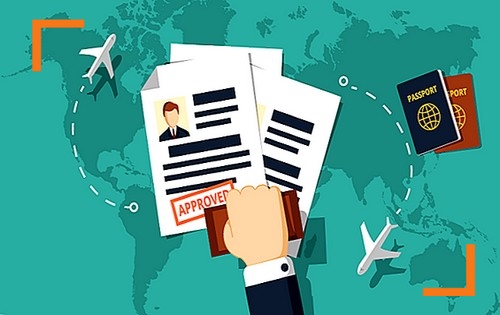 Administrative procedures
Administrative procedures
Passport, visa and length of stay
To avoid any problems when you arrive in Morocco, double-check to be sure you have a valid passport.
Whether you need a visa depends on your nationality.
For all nationalities, the maximum length of a tourism trip is 90 days.
Embassies and consulates
As you prepare for your trip, make note of the contact information for your embassy and consulates outside the capital. You can go there to reissue your travel documents if they are lost and to get an array of advice (health, safety, etc.). Each diplomatic mission usually has an emergency number to be used only if absolutely necessary. Most of the time there is a social services office to help you, even in an emergency.
Currency exchange
The currency in Morocco is the dirham. It cannot be exchanged outside the country’s borders, so plan your currency exchange transactions and consider other forms of payment.
There are currency exchange desks in the airports, some hotels and most banks. You will have to show your passport to exchange money.
Credit cards
Check with your bank to find out where you can withdraw cash using your credit card. Most banks in Morocco’s major cities have ATMs. Exchange currency as you go. The vast majority of purchases and services are paid for in cash – afterbargaining, of course!
Currency Exchange
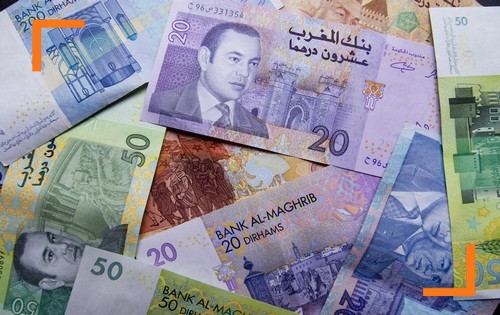 The currency in Morocco is the dirham. It cannot be exchanged outside the country’s borders, so plan your currency exchange transactions and consider other forms of payment.
The currency in Morocco is the dirham. It cannot be exchanged outside the country’s borders, so plan your currency exchange transactions and consider other forms of payment.
There are currency exchange desks in the airports, some hotels and most banks. You will have to show your passport to exchange money.
Credit cards
Check with your bank to find out where you can withdraw cash using your credit card. Most banks in Morocco’s major cities have ATMs. Exchange currency as you go. The vast majority of purchases and services are paid for in cash – afterbargaining, of course!
Climate and Seasons
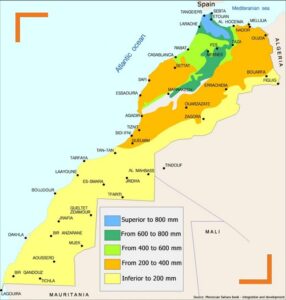 Morocco is a land of contrasts. Lapped by the water of the Mediterranean in the north and by the waves of the Atlantic Ocean to the west, it is also crisscrossed by the Rif and Atlas Mountains, which means the country is affected by a host of climatic influences.
Morocco is a land of contrasts. Lapped by the water of the Mediterranean in the north and by the waves of the Atlantic Ocean to the west, it is also crisscrossed by the Rif and Atlas Mountains, which means the country is affected by a host of climatic influences.
The coastal regions are lavished with sunshine. The sun’s rays are constant throughout the year and you can soak up their goodness in any season. Agadir, for example, is on the shores of the Atlantic. As the country’s premier seaside resort town, it offers fans of la dolce vita300 days of sun per year with mild temperatures and gentle breezes. Further to the north, Taghazout, Mogador and Magazan are also worth a visit.
Because these are a bit further inland, their climate is less Mediterranean and more continental. The topography is more pronounced with splendid panoramas. This is where you find wide, open spaces where adventurers embark on treks and hikes in all seasons.
To the south, the country opens up to the vastness of the Sahara. Spring and fall are the best times to venture here. The sun gleams and reflects off the dunes in a sand-filled landscape. The desert expanses exude a sense of unreality. Climb atop a camel tofind yourself in one of the most beautiful scenes nature has ever made.
Local Clock and Holiday Schedule
Morocco invites you to enjoy its uniquely paced lifestyle
In Morocco, every holiday is cause for a celebration in which you will be thrilled to take part. The atmosphere is quite different and very rewarding at these times.
The dates of religious holidays depend on the lunar calendar. The month of Ramadan will give you a chance to experience something out of the ordinary: it’s all about sharing and nightlife!
Morocco is on GMT and GMT+1 in the summer. It’s very easy to adjust to the different schedule and you will not waste a minute of your exceptional trip!
Language
Language and common vocabulary
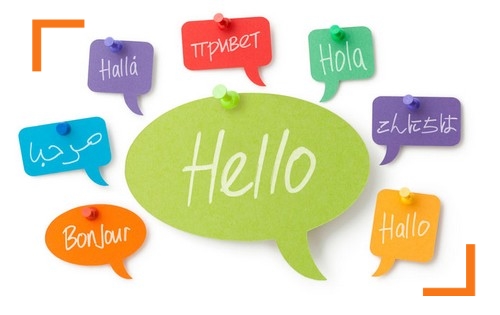 Exploring a country means learning about the language. Morocco’s two official languages are Arabic and Amazigh, or Berber, but virtually all Moroccans speak and understand French. Spanish is widespread in northern and southern Morocco. You will be enchanted by Arabic. The language sings and its warm intonations encourage conversation. The Amazigh language, which uses the Tifinagh alphabet, is the shared heritage of all Moroccans.
Exploring a country means learning about the language. Morocco’s two official languages are Arabic and Amazigh, or Berber, but virtually all Moroccans speak and understand French. Spanish is widespread in northern and southern Morocco. You will be enchanted by Arabic. The language sings and its warm intonations encourage conversation. The Amazigh language, which uses the Tifinagh alphabet, is the shared heritage of all Moroccans.
To rub elbows with the locals and make the most of your trip, here are some Arabic concepts you should learn. Once you leave your hotel, a few words are all it takes to make contact. With “as-salaam alaykum” you have said hello to a new friend, who will reply with “waalaykum as-salaam”. Ask “labass” to find out how he’s doing, then say goodbye with a hearty “beslama”.
When your day takes you to the souk, the art of negotiation kicks in. For successful dealings, make note of these essential phrases: “kayen” means “do you have” something; “ma’arft” means you are not sure; “iyah” and “lla” mean “yes” and “no”. Finally, say “rally bizef” for “too expensive” and the bargaining has begun!
Later, as you order tea on the patio, tell your server “AtiniAttay” for “I’d like a mint tea” and when he brings it to you, thank him: “Shukran”.
Because Moroccans have a natural gift for languages, your stay is destined to be a pleasant one!
Accommodation for All Budget
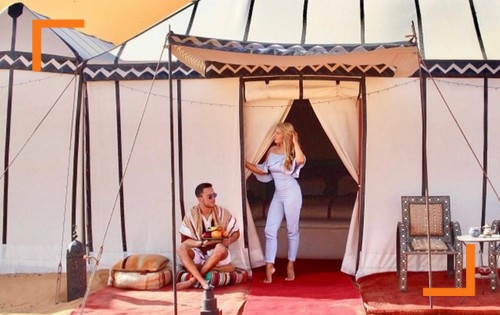 The culture, exoticism and warmth of Morocco welcome you for an unforgettable stay
The culture, exoticism and warmth of Morocco welcome you for an unforgettable stay
With luxury chains, camping, riads, bed and breakfasts, cottages, hostels and even bivouacs, you will be treated to unique experiences!
Spend a night in a bivouac — a tentin the middle of the desert – tounplug completely. Let yourself be swayed by the timeless ambiance of the desert and wake up to the world’s most beautiful sunrise fora unique experience that you won’t soon forget!
Or stay in a riad, a traditional house in a historic district punctuated by a patio in the middle of a column of light. Your stay is guaranteed to feel authentic.
Exploring a country also means getting to know the locals and experiencing their everyday lives at home.
Choose a cottage or hostel to have a sightseeing experience full of direct contact with the native population.
Or why not go camping? It is the preferred way to stay for surfers working up the coast. Camping in the mild Moroccan climate promotes team spirit and human contact.
Finally, if you are hoping for a premium trip, sleep in the best international or local luxury brands for hotels that have built a long-standing reputation!
In Morocco, you will be an honored guest.


